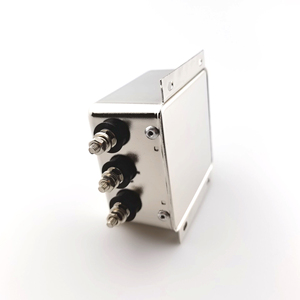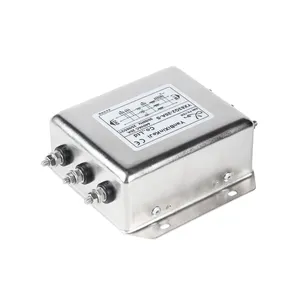
All categories
Featured selections
Trade Assurance
Buyer Central
Help Center
Get the app
Become a supplier

(2921 products available)





































The primary role of three-phase line filters is to suppress electromagnetic interference. This maintains the quality of the power supply for sensitive equipment and prevents disturbances from being transmitted through the electrical lines. Three-phase filters can be classified into several categories to meet different needs.
These filters include:
LC Filters
LC filters are the most commonly used type of three-phase line filter. This is so because LC filters consist of a combination of inductors and capacitors. These components work together to attenuate undesirable high-frequency noise while allowing the fundamental power frequency to pass with minimal loss. In LC filters, inductors are used to block higher frequencies through a series configuration, while capacitors shunt the high-frequency noise to the ground.
Trap Filters
Trap filters are designed to attenuate specific frequency ranges. They are extremely useful when there is a known interference at a particular frequency, such as radio broadcast or communication frequencies. These filters are often used in applications where a narrow band of frequencies needs to be blocked, while all other frequencies can pass with little attenuation.
Pi Filters
This three-phase filter consists of two capacitors and an in-between bonded inductor. This configuration is effective at filtering out high-frequency noise. The alternating arrangement of capacitors and inductors in the pi filter creates a filter that has a high degree of attenuation for frequencies outside the desired range.
T and Delta Configured Filters
These filters are designed to provide balanced impedance to three-phase loads. They are effective at cancelling common-mode noise while allowing differential mode signals to pass. Delta-configured filters provide a low-impedance path for common-mode currents, helping to reduce noise on the power lines.
Notch Filters
These filters are designed to eliminate a specific unwanted frequency. This is done by attenuating only that one frequency while allowing all other frequencies to pass. Notch filters are particularly useful in applications where there is a strong interference at a particular frequency. An example of this is eliminating harmonics generated by nearby industrial equipment.
Smoothing DC Output
Three-phase line filters can help reduce the ripple voltage that occurs in the process of converting AC to DC. High-frequency noise can cause fluctuations in the DC voltage. The filters can attenuate this noise, leading to a smoother DC output voltage. A smoother DC output is especially critical for high-precision applications such as robotics, semiconductor manufacturing, and process control in the chemical industry.
Noise Reduction in Variable Frequency Drives (VFDs)
Variable frequency drives are widely used to control motors in industrial applications. Three-phase line filters can help reduce the conducted emissions that VFDs typically generate. This protects other sensitive equipment nearby and ensures compliance with electromagnetic compatibility regulations. Filters can also help mitigate voltage spikes caused by the rapid switching of power transistors in VFDs.
Ensuring Power Quality for Electroplating Equipment
In the electronics and metal finishing industries, electroplating is used to deposit metal coatings on surfaces. In these processes, power quality is of utmost importance. Line filters ensure that electroplating equipment receives a stable, high-quality power supply free from noise and fluctuations. This is vital for ensuring the electroplated coating is smooth and uniform.
Protecting Medical Equipment in Hospitals
Hospitals are one of the critical places where three-phase line filters are necessary. They help ensure that medical imaging devices, surgical equipment, and patient monitoring systems operate reliably. Filters protect sensitive medical devices from electrical noise that could cause malfunction or inaccurate readings.
Providing Clean Power to Telecommunications Equipment
The telecommunications industry relies on three-phase power to run its network infrastructure. Filters are then used to ensure that the network switches, routers, and other telecommunications equipment receive a clean, noise-free power supply. This helps in maintaining the quality and reliability of the long-distance telephone and data transmission systems.
Reducing Flicker in Large Commercial Lighting Systems
Flicker in large commercial lighting systems can cause discomfort to people and reduced productivity. Three-phase line filters then help in reducing flicker by smoothing the power delivered to lighting fixtures. This is particularly beneficial in commercial spaces where large banks of fluorescent or LED lights are installed.
The three-phase line filter has a variety of specifications. These are dependent on the model and manufacturer, as well as the application it was intended for.
The key filter components are:
Inductors
Three-phase line filters typically use iron core inductors with high saturation current to ensure they can handle loads without losing filtering effectiveness. They come in a variety of sizes depending on the application's current and voltage requirements. Some common voltage ratings for the inductors include 400 volts, 800 volts, and 1600 volts.
Capacitors
The capacitors in three-phase filters are designed to handle high voltages and maintain stability under varying load conditions. These capacitors have low equivalent series resistance to minimize power dissipation and heat generation. They also have a high ripple current rating to allow them to handle the pulsating currents in industrial environments.
Housing
Three-phase line filters are commonly mounted in durable, compact enclosures that allow for easy installation. The housing materials are typically steel or aluminum in order to provide both protection and effective shielding from electromagnetic radiation.
Grounding
Grounding is an important aspect of three-phase line filters. Proper grounding helps to dissipate unwanted noise and interference safely into the ground, reducing the risk of electrical shock and equipment damage. This also improves the overall filtering effectiveness by providing a low-impedance path for common-mode currents.
Isolation Transformers
Some three-phase line filters are combined with isolation transformers. The transformers provide electrical isolation between the primary and secondary windings. This helps in the suppression of noise while also providing voltage transformation for increased or decreased voltage levels as per the requirements.
Three-phase line filters have a lot of quality and safety considerations. These ensure reliable and safe operations in industrial settings.
Component Quality
High-quality materials are essential for the capacitors and inductors used in three-phase line filters. This is because the manufacturers of the filters are usually required to residents ensure they choose materials that can withstand continuous stress without degrading over time. This reduces the likelihood of failure. Watching what materials are used not only improves the longevity of the filter but also enhances its performance in critical applications.
Heat Dissipation
Filters commonly installed in high-load industrial applications generate significant heat. This can cause damage to the internal components of the filter as well as impact the electrical equipment's performance. Effective heat dissipation mechanisms, such as ventilation and proper mounting, are necessary to help prevent overheating. When mounting the filter, ensure there is enough space around the unit to allow for air circulation.
EMI Compliance
Three-phase line filters must ensure compliance with electromagnetic interference regulations. These prevent interference from being emitted into the environment. Most industrial standards easily ensure these requirements compliances. They do so by including built-in components such as ferrite beads or metal shielding around the filter.
Load Matching
It's very critical that the three-phase line filter be matched to the electrical load of the connected equipment. A mismatch between the filter and the load can cause attenuation of the electrical signals. This then leads to performance issues or even damage to the filter itself. Proper load matching ensures optimal filtering performance and reduces the risk of burnout caused by excessive power.
Ground Connections
A properly maintained ground connection is essential for safety in three-phase filter installations. Grounding helps in preventing electrical shock and protects against power surges. It also improves the effectiveness of the filter by providing a return path for filtered noise. It's critical that the filters are properly grounded.
The three-phase line filter's right choice depends on several important factors. Here are those factors considering the filter's performance and reliability.
Load Type
Filters should be chosen based on the type of electrical load they will serve. Different loads have distinct power requirements and sensitivity to noise. For instance, in precision manufacturing, fine electronic equipment often requires specialized filters. These three-phase induction motor starters come with capacitors that create a low-pass filtering effect. This buffers the equipment from electrical interference.
Frequency Range
Select a filter with an adequate cutoff frequency to block unwanted noise effectively. At the same time, allow the fundamental power frequency (50/60 Hz) to pass without attenuation. Failure to meet this requirement causes either signal degradation or inefficiencies. Not only that, but it can also lead to excessive heating and potential damage.
Power Rating
Watch the line filter's power rating to ensure it can handle the maximum load without risking burnout. What this entails is that the power rating of the filter should be equal to or greater than the maximum power consumption of the connected equipment. The voltage rating should also match the system voltage to ensure proper operation.
Environmental Conditions
Consider the operating environment where the three-phase line filter will be used. There are industrial settings with extreme temperatures and high humidity or exposure to dust and debris. All these are vital for a three-phase line filter with appropriate enclosures and cooling mechanisms that protect the internal components.
Regulatory Compliance
Ensure the filters meet relevant regulatory standards in the intended region and industry. What these standards help with is electromagnetic emissions control. These regulations help in ensuring safety and environmental protection. Compliance then goes a long way in reducing the risk of legal issues and downtime.
Installation and Maintenance
Easy installation and low-maintenance are key factors when choosing a three-phase line filter. Manufacturers do provide user-friendly mounting options and clear instructions. This makes the installation process a whole lot easier. Additionally, filters with easily accessible components for maintenance ensures the system can be serviced.
Without filters, disturbances from power lines easily interfere with sensitive equipment. These interferences not only disrupt operations but also lead to damage as well as increased downtime. Moreover, unfiltered electrical noise pollutes the environment, contributing to the risk of electromagnetic interference to nearby devices.
Heavy industrial equipment that commonly uses these filters includes large motors, variable frequency drives, and power supply systems. Specifically, manufacturing plant machinery, steel mill equipment, and petroleum refinery control systems all benefit from the use of line filters. The filters help in protecting vital components and ensuring the machinery operates smoothly under heavy loads.
Yes, three-phase line filters require additional care when operating in such environments. Proper maintenance and monitoring of the filter components are vital in the harsh environment of mining and cement plants. The filters need to be checked frequently and have their induction motor starters replaced often, as high dust, humidity, and temperature can cause them to burn out.
While the main purpose of these filters is not to save energy, they can reduce energy waste. They do this by minimizing electrical noise and ensuring a more stable power supply to the equipment. This leads to improved efficiency during operations and a reduction in energy wastage through heat and undesired motor misalignments.